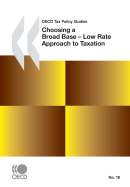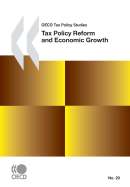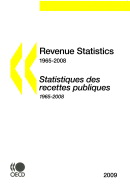Tax policy analysis
Tax Reform: Restoring Growth
TAX POLICY REFORM and FISCAL CONSOLIDATION
Given the current high levels of budget deficits and government debt, Governments recognize that they need to consolidate their budgets. Taxes can give rise to a multitude of disincentives to work, invest and innovate, with adverse effects on economic growth and welfare. But how can such distortions be minimised?
The Tax Policy Brief “Tax Policy Reform and Fiscal Consolidation” emphasizes the importance of tax regimes supporting sustainable economic growth. In particular, it recommends:
- Changing the overall structure of taxation to raise more revenue from taxes on consumption and from recurrent taxes on residential property and less from income taxes, particularly corporate income tax;
- Broaden tax bases to enable rates to be kept as low as possible;
- A greening of the tax system is a crucial element of a Green Growth strategy. The primary aim should be to design taxes that achieve environmental objectives, but the additional revenues raised may facilitate wider growth-oriented tax reforms;
- Better tax compliance can also contribute to fiscal consolidation and produce a fairer tax system. Recent OECD initiatives to improve cooperation between tax authorities to counter offshore non-compliance are already yielding billions of euros in extra tax revenues.
Choosing a Broad Base – Low Rate Approach to Taxation
Many countries are likely to have to raise taxes as part of fiscal consolidation over the next few years, but how is this best done - by broadening the tax base or by raising tax rates?
|
|
Tax Policy Study No. 19 explores in detail the rationale for tax breaks, critically examines whether different tax breaks are still justified and explores a number of case studies, including VAT reduced rates and tax reliefs for house purchase. It notes that ”tax expenditures” often get entrenched in tax regimes and urges countries to take advantage of the need for fiscal consolidation to evaluate whether they continue to be worthwhile.
More information:
|
Tax Policy Reform and Economic Growth
OECD Tax Policy Studies No. 20
In the wake of the recent financial and economic crisis, how OECD countries can face the challenge of restoring public finances without jeopardising economic growth?
|
|
Tax Policy Study No. 20 sets out in detail the empirical evidence and rationale for changing the structure of tax regimes. It discusses how taxes can be made less distortionary and more growth-friendly. The study also looks at the “political economy” of tax reform. Why are governments able to design, legislate and implement growth-oriented tax reforms in some circumstances and not others? How can policy makers overcome the obstacles to tax reform and make tax reform actually happen?
More information:
|
OECD Revenue Statistics, 2010 Edition
For more information: www.oecd.org/ctp/revenuestats
|
|
This annual publication presents a unique set of detailed and internationally comparable tax revenue data in a common format for all OECD member countries from 1965 onwards. It also describes a conceptual framework to define which government receipts should be regarded as taxes and to classify different types of taxes.
The 2010 edition includes a Special Feature titled ‘Environmentally related taxation’ |
OECD Tax Policy Analysis Department
Related Documents


